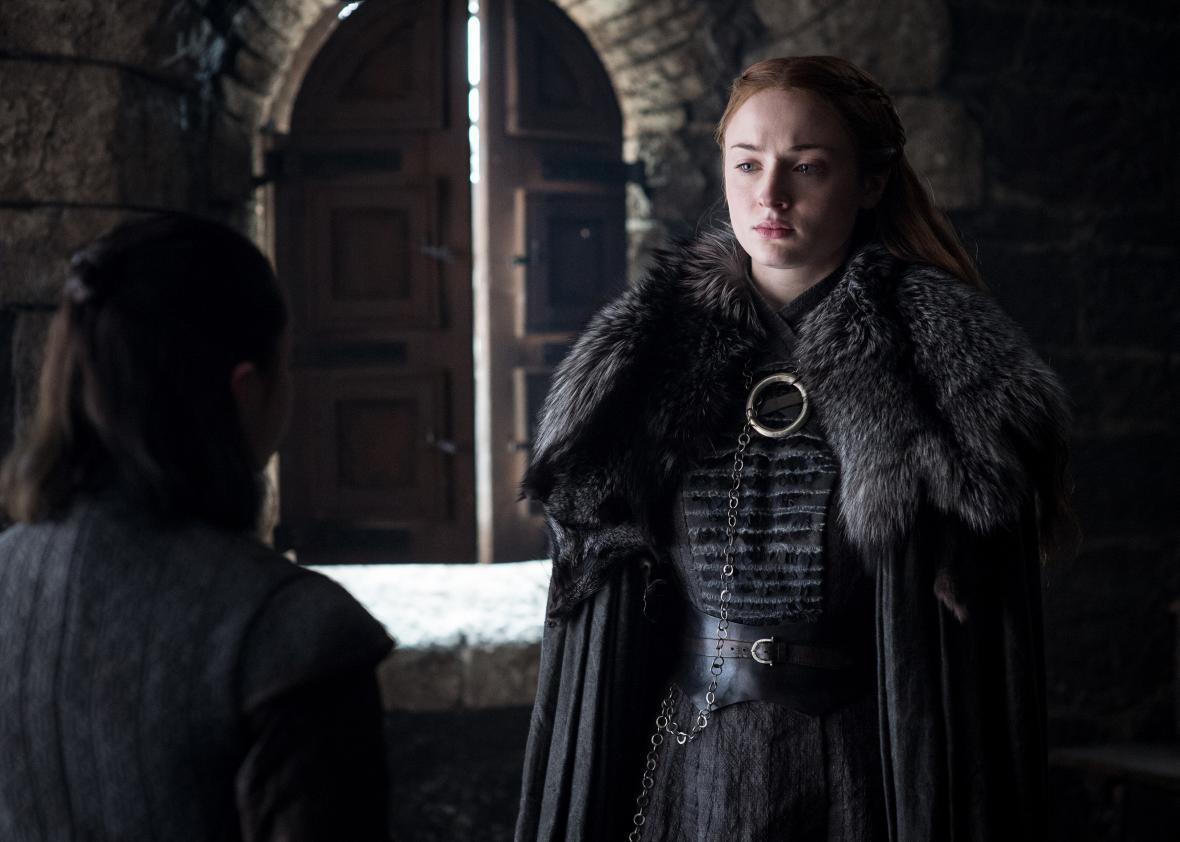Game of Thrones’ Sansa and Arya Stark are two strong women whom the patriarchy has chewed up and spat out in vastly different ways.
Arya was never allowed to be what she wanted to be: a knight, a fighter, a warrior, like her beloved older brothers. If it weren’t for her father, Ned, she would never have even been allowed to touch a sword, let alone thrust it through the glass ceiling. When he eventually caved to her insistent pleas, she was years behind the boys, and the progress she made was slow and laborious, working many times as hard and without instruction. As she tells Sansa in “Beyond the Wall,” she had to practice in Winterfell’s courtyard with just a single arrow, walking up and collecting it after each shot.
Young Sansa, on the other hand, played into societal norms, leaning into her femininity and embracing her role as a traditional Westerosi woman. All she hoped for was a nice (rich) husband who would treat her kindly and give her children, maybe a queendom—not an implausible ask considering her position as the firstborn daughter of a noble family. She did what Game of Thrones’ quasi-medieval society told her to do: She put on the dress, braided her hair, and played the obedient future spouse. She was tortured, detained, and raped in return.
“We both wanted to be other people when we were younger,” Arya tells her sister. “The world doesn’t just let girls decide what they’re going to be.”
Whether they choose to embrace the fact or reject it, Westerosi women are near-powerless to determine their own destinies. They need to stick together at all costs—which is why it was so distressing to see the sisters slowly turn on each other, thanks to the deft manipulation of Petyr “I loved your mother” Baelish. (Ladies, never let a man come between you.)
In retrospect, Sansa and Arya’s actions during Game of Thrones’ first season, when Ned was imprisoned, and eventually executed, by Cersei neatly summarize their differing approaches to their lives as women. Sansa, betrothed to King Joffrey, played by the rules and tried to work within the system to save her father, even if that meant betraying the North. That’s not an approach Arya can empathize with. The rules, Arya figured out long ago, are better off disregarded. “I knew it wasn’t wrong,” she says of her father’s allowing her to pick up that forbidden bow and arrow. “The rules were wrong.”
The Stark sisters allowed their respective hardships to divide instead of unite them, competing over which of them had it worse. “You never would have survived what I survived,” says Sansa bitterly, and with good reason. Arya should know how hard life has been for Sansa, if not the precise, brutal details of what she’s endured, but rather than bond over their common powerlessness, Arya insults her for her weakness. When Sansa says that they “forced” her to write the letter to Cersei, Arya sneers at her for giving in too easily. “Did they put a knife at your throat? Did they put you on a rack and stretch you until your bones started to pop?”
Arya is not done venting her pent-up frustration at her sister. She’s also furious at Sansa for daring to look pretty at her father’s unexpected execution. Sansa, as was her habit, was conforming to norms—this wasn’t Flea Bottom, and she couldn’t exactly come out to what she expected to be Ned’s royal pardon wearing an onion sack. Arya, breaker of gender roles (and rules), isn’t able to comprehend that this was also something Sansa was compelled to do, not by the Lannisters but by society itself.
Even Cersei Lannister, not one for making girlfriends, implicitly understands that women need to look out for one another. When Sansa had her first flowering in Season 2, Cersei shared some “womanly wisdom” with the poor, scared young woman about to enter a loveless marriage, just as Cersei had before her. She subtly confided in Sansa her misgivings about her son—“Joffrey’s always been difficult”—and offers some consolation for the suffering to come: “You may never love the king, but you will love his children.” She gave Sansa another bitter lesson about the power of using “what lies between your legs,” and during the Battle of the Blackwater, invited the noblewomen of King’s Landing to join her in Maegor’s Holdfast, where Ser Ilyn Payne stood ready to ensure that, in the event of defeat, they will be executed rather than captured and raped. Even Cersei’s revenge against Ellaria Sand seemed motivated in part by fury at the bitchy, two-faced way in which she had killed Cersei’s daughter, with poison disguised as a farewell kiss.
Arya and Sansa have so much that unites them— being women, being sisters, being Starks. You would think after five seasons of suffering they might be able to see this clearly. Sadly, the sisters continue to let themselves be divided by their differences: on how to be a Stark and, most of all, how to be deal with the hardship of being a woman.
